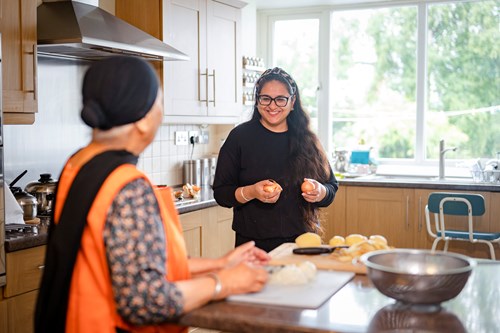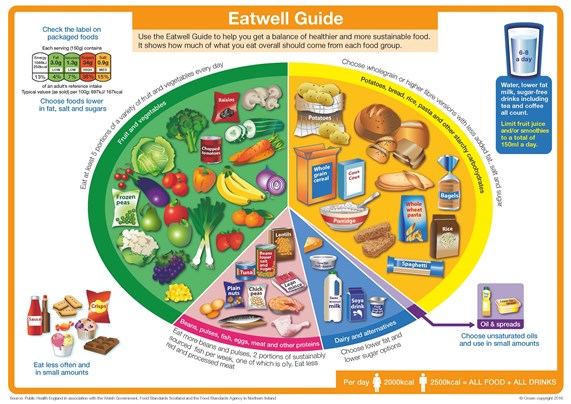Eating well
Caring over time can sometimes take over and it's easy to neglect your own health or reach for the easiest convenience options when you feel short of time.
Over time, it's easy to slip into unhealthy habits and reach for the wrong 'comfort' foods to keep us going. However it's possible to break those habits and there are some simple steps you can take to prepare meals for yourself and those you care for more easily, eat more healthily and feel better. We offer tips and guidance to help. 
Understanding the benefits
No matter what your weight, by understanding how to achieve a balanced diet and how to fit this into your lifestyle, you can manage your weight and feel better.
It's good to be reminded that balance is the key to a healthy diet. Enjoying foods from all the different food groups is important to provide your body with all the nutrients it needs. The NHS Eatwell Guide provides a helpful illustration of what we should be aiming for to maintain good health - where possible, having a balance from all the main food groups in the proportions shown:

This Share and Learn video provides more insights from a dietician's perspective and looks at the eat well plate concept more closely.
How the right foods can help you feel better
Knowing which food and drinks to eat can really help to give the energy boost you need to look after yourself as well as those you care for, as well as strengthening your immune system.
Helping those you care for to eat well may feel like a big responsibility. Sometimes it can be difficult if they have dietary needs due to a certain condition such as dementia, cancer or swallowing problems. For further website details, go to our section on Looking after someone and nutrition.
It is recommended that everyone aims for a balance of different food groups:
- Plenty of starchy food
Bread, breakfast cereals, potatoes and pasta are a good source of energy. Always choose wholegrain varieties where you can. - Plenty of fruit and vegetables
Aim for five portions a day to provide you with a good source of vitamins and minerals. One portion is equivalent to: one apple, one medium banana, seven strawberries, a handful of grapes, 150ml glass of unsweetened orange juice, dessert bowl of salad, three heaped tablespoons of mixed vegetables. - Some protein
Meat, fish, eggs, beans are a good source of protein. - Some milk and dairy foods
Cheese, yoghurt or choose low-fat options if trying to reduce fat in your diet. - Limit the amount of foods high in fat or sugar such as crisps, chocolate, sweets.
Studies have shown that certain combinations of nutrients may help to support healthy brain function. These nutrients include healthy fats, such as omega-3 fish oils, vitamins and minerals, which can be found in the following foods:
- plenty of fruit and vegetables to provide a good source of vitamins and minerals
- nuts, seeds and olive oil to provide a variety of healthy fats
- oily fish to provide a good intake of fish oil, which is rich in omega-3 (at least twice a week if possible).
For more information, see the NHS website.
If you are on a budget, there are some simple and affordable ways to shop for healthier foods:
- Use supermarket own brands as a cheaper alternative to branded products.
- Look out for offers on foods that keep, such as tins of pulses or tomatoes.
- Dried, frozen or canned fruit (in juice) and vegetables are cheaper than fresh varieties – and just as healthy.
- When you buy fresh fruit and vegetables, it can be cheaper to buy them loose rather than pre-packaged. In addition, it is usually cheaper to buy fruit and vegetables when they are in season.
- Supermarkets often reduce prices on products that are close to their sell by date and this can be a great way to pick up a bargain if you can shop towards the end of closing time. But be sure you can cook or eat everything you buy (or are able to freeze it) before it goes off.
- When making meals, prepare large quantities and freeze the extra portions. This can be a cost effective and time effective way of maintaining a balanced diet.
- Plan ahead! It can be tempting to fall back on junk food or quick takeaways so plan meals in advance. This way you will have all the ingredients you need to prepare a balanced meal.
- Try to eat everything in moderation. Unless you have particular dietary requirements, there is usually no need to cut out any food group, as long as you control your portion size. For example, you could have smaller portions by using a small plate.
- Replace high fat and sugary food with starchy options, which provide plenty of energy to fuel you through the day.
- Snack on high fibre foods, which can keep you feeling fuller for longer.
Nuts, fruit and vegetables are high in fibre and make nutritious snacks. - Eat plenty of fruit and vegetables. Try including fruit or vegetables at every meal, for example you could add fruit to cereal at breakfast.
- As a carer, it can be difficult to get enough exercise. Always try to walk when possible; take the stairs instead of the escalators and consider a video workout class if you are indoors a lot.
If you are struggling to eat a balanced meal, or have simply gone off your food, here are some practical tips to help improve your nutritional intake:
- Eat small, frequent meals and snacks every 2-3 hours.
- Opt for foods that are higher in calories and protein, such as: meat, fish, eggs, full fat dairy products (like yoghurt and cheese).
- When on the go, eat snacks like nuts, crackers and cereal bars, which provide plenty of energy.
- Consume nourishing drinks based on milk to increase energy and protein intake. These are also available as ‘ready to drink’ options, which are convenient when you are at home or out and about. Your pharmacist may be able to recommend a type that is suitable.
*Important notes
- Anyone who has other conditions such as diabetes or high cholesterol should always seek personal advice from their health professional, before taking these steps.
- Anyone experiencing problems in the longer term should speak to their GP or another health professional.
Some illnesses or long-term conditions can make it difficult to judge what will be most helpful and beneficial for someone you care for. It’s important not to deal with this alone, especially if their condition varies or the situation is complex.
For advice about medical nutrition, speak to your GP especially if you are worried that someone you look after is not receiving all the nutrients they should. This guide about talking to your GP may be helpful.
